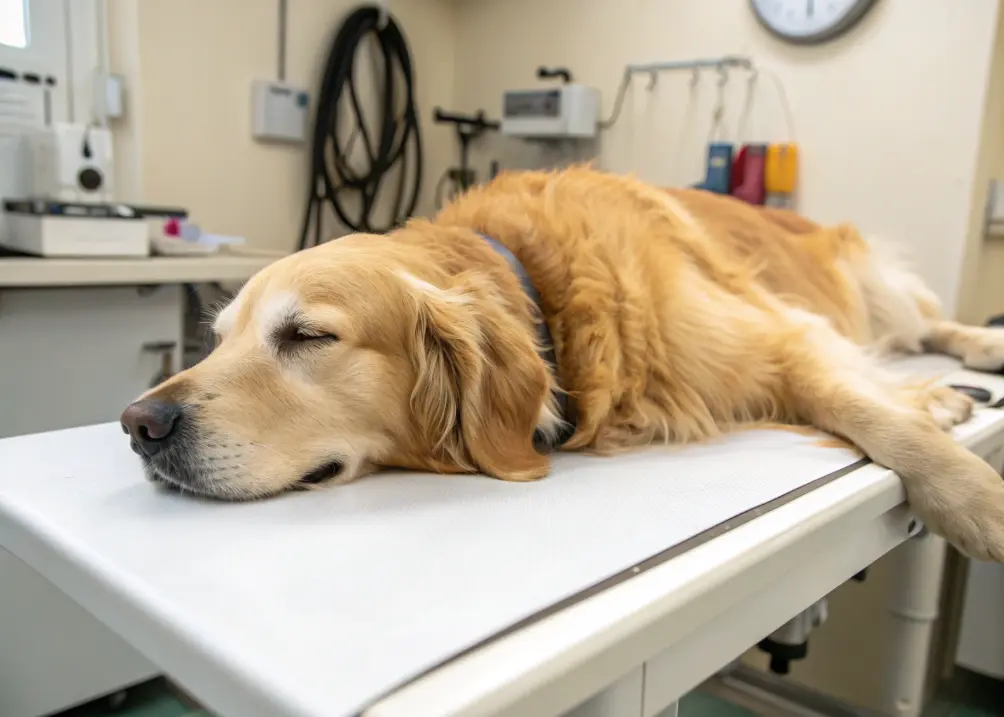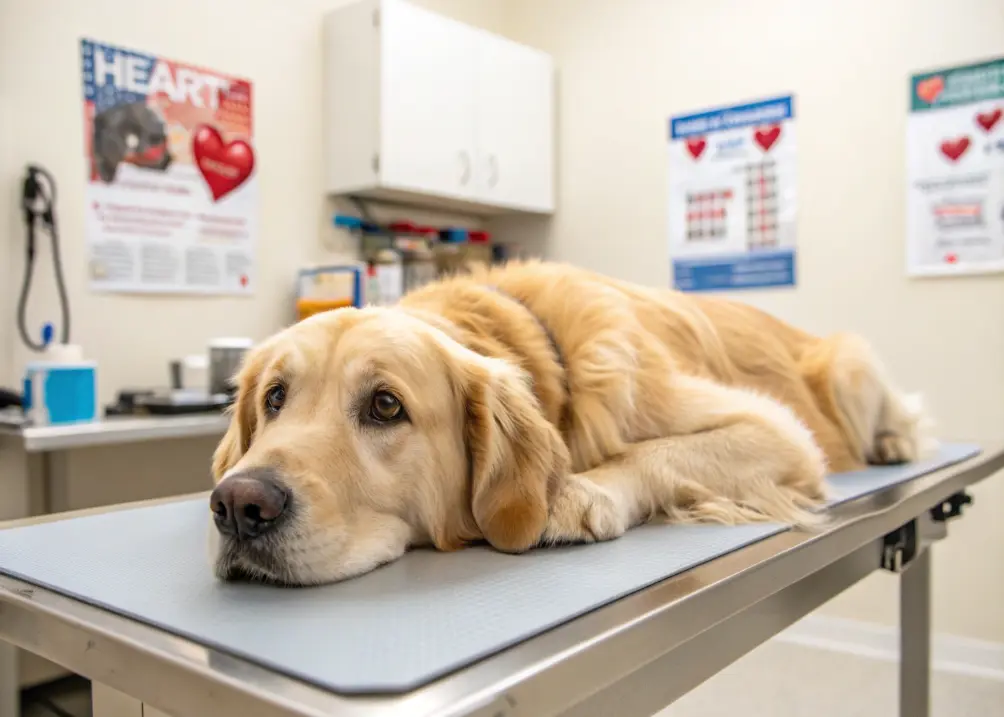Health Problems in Golden Retrievers You Need to Know About
Golden Retrievers are sunshine on four legs. Anyone who has lived with one knows how goofy, gentle, and affectionate these dogs are. They’re always ready for a game of fetch, a cuddle on the couch, or even just following you from room to room like a little golden shadow.
But here’s the thing… as much as Goldens bring us joy, they also come with some health baggage. They’re one of the most loved breeds worldwide (ranked consistently in the top 5 most popular breeds by the American Kennel Club), but they’re also prone to several medical problems. And if you’re a Golden parent (or planning to become one), it’s important to know what those issues are — so you can catch them early, manage them, or sometimes even prevent them.
This post isn’t about scaring you off Goldens (trust me, they’re worth every bit of fur on your couch). It’s about giving you the knowledge to keep them healthier and happier for as long as possible.

1. Cancer in Golden Retrievers
Let’s rip the band-aid off first. The biggest health concern in Golden Retrievers is cancer. Studies show that over 60% of Golden Retrievers will die from some form of cancer — one of the highest rates among dog breeds. That’s heartbreaking, but it’s the reality.
The two most common cancers in Goldens are:
- Hemangiosarcoma (cancer of blood vessel walls, often aggressive)
- Lymphoma (cancer of lymphocytes, a type of white blood cell)
Golden Retriever Lifetime Study (run by the Morris Animal Foundation) is following 3,000 Goldens over their lifetimes to figure out why they’re so cancer-prone. Genetics definitely play a role, but environment and diet may be factors too.
➡️ Early signs can be subtle: unusual lumps, fatigue, sudden weight loss, or even internal bleeding that shows up as collapse.
What you can do:
- Schedule regular vet visits (at least once a year, twice for seniors).
- Don’t ignore lumps or sudden health changes.
- Ask your vet about blood work and ultrasounds if something feels “off.”

2. Hip Dysplasia
Hip dysplasia is basically when the hip joint doesn’t fit properly, causing pain and arthritis. Goldens, being medium-to-large dogs, are especially prone.
The Orthopedic Foundation for Animals says hip dysplasia is one of the most common orthopedic problems in Goldens. It can show up as early as puppyhood or later as arthritis.
Symptoms:
- Bunny-hopping gait
- Difficulty getting up or climbing stairs
- Stiffness after rest
What helps:
- Keeping your Golden at a healthy weight (extra pounds = more joint stress).
- Joint supplements like glucosamine and chondroitin (ask your vet first).
- Controlled exercise (not too much jumping for puppies).
- In severe cases, surgery like hip replacement may be needed.

3. Elbow Dysplasia
Like hip dysplasia, elbow dysplasia is a developmental joint issue. Goldens can inherit this too. It usually shows up as lameness in the front legs, stiffness, or your dog avoiding putting weight on one paw.
Left untreated, it leads to arthritis and lifelong pain.
Treatment:
- Pain meds from the vet
- Weight management
- Physical therapy, hydrotherapy
- Sometimes surgery

4. Heart Problems
Golden Retrievers are also at risk for heart diseases like:
- Subvalvular Aortic Stenosis (SAS): a narrowing of the heart’s aortic valve, common in large breeds.
- Dilated Cardiomyopathy (DCM): heart muscle weakens, leading to heart failure.
Symptoms may include fainting, coughing, exercise intolerance, or sudden death in severe cases.
➡️ Regular vet checkups, including heart auscultation and echocardiograms (if your vet recommends), can catch these early.

5. Skin Problems & Allergies
Goldens have beautiful coats, but their skin is sensitive. Allergies are super common in this breed. These can be caused by:
- Food (chicken, beef, dairy are common triggers)
- Environmental allergens (pollen, dust mites, mold)
- Flea bites
Signs:
- Constant itching, scratching, chewing paws
- Ear infections
- Hot spots (red, inflamed patches on skin)
Managing allergies:
- Special diets (hypoallergenic or limited-ingredient foods)
- Medications like Apoquel or Cytopoint (vet prescribed)
- Frequent baths with medicated shampoos

6. Ear Infections
Their cute floppy ears? Yeah, they’re infection magnets. Goldens have narrow, hairy ear canals that trap moisture. Combine that with swimming (which Goldens love), and you’ve got the perfect recipe for ear infections.
Signs:
- Head shaking
- Scratching ears
- Bad odor
- Redness inside ears
Prevention:
- Clean ears regularly with vet-approved solution.
- Keep ears dry after swimming.

7. Eye Problems
Common eye conditions in Goldens include:
- Cataracts – cloudy lenses, can lead to blindness.
- Progressive Retinal Atrophy (PRA) – inherited, leads to gradual blindness.
- Glaucoma – high eye pressure, painful, vision loss.
➡️ Annual eye exams with a veterinary ophthalmologist are recommended, especially if you plan to breed.

8. Hypothyroidism
This is when the thyroid gland doesn’t produce enough hormones. Goldens are one of the breeds at higher risk.
Symptoms:
- Weight gain without eating more
- Hair loss, dull coat
- Lethargy
Good news? It’s manageable with daily thyroid medication (cheap and effective).

9. Obesity
Goldens love food. And they’re masters of puppy-dog eyes, which makes owners overfeed them. But obesity shortens their lifespan and worsens joint, heart, and metabolic problems.
According to the Association for Pet Obesity Prevention, over 55% of dogs in the U.S. are overweight or obese. Goldens are no exception.
Prevention:
- Stick to portion-controlled meals.
- Limit high-calorie treats.
- Daily exercise (walks, swimming, playtime).

10. Epilepsy
Goldens can suffer from epilepsy, which causes recurring seizures. Seizures can range from mild (staring, twitching) to severe (falling, convulsions).
While there’s no cure, seizures can often be controlled with medication and lifestyle adjustments.

11. Bloat (Gastric Dilatation-Volvulus)
Bloat is a life-threatening emergency where the stomach fills with gas and twists. Large-chested breeds like Goldens are prone.
Symptoms:
- Distended belly
- Unproductive retching
- Restlessness, drooling
➡️ Immediate vet care is needed. Some owners even choose preventive surgery (gastropexy) for at-risk dogs.

12. Lifespan and Preventive Care
The average lifespan of a Golden is 10–12 years. Sadly, shorter than many smaller breeds. But preventive care can make a huge difference.
Tips:
- Annual vet checkups (twice yearly for seniors).
- Healthy diet, daily exercise.
- Dental care (brushing or dental chews).
- Regular grooming (skin checks, ear cleaning).
- Mental stimulation (training, puzzle toys).

FAQs About Golden Retriever Health
1. Do all Golden Retrievers get cancer?
Not all, but the risk is high (around 60%).
2. What’s the most common cause of death in Golden Retrievers?
Cancer, especially hemangiosarcoma and lymphoma.
3. How long do Golden Retrievers usually live?
10–12 years on average.
4. Can diet reduce health risks in Goldens?
Yes, balanced diets help prevent obesity and may support long-term health.
5. Are Golden Retrievers prone to ear infections?
Yes, due to their floppy ears and love for water.
6. Can exercise prevent hip dysplasia?
It won’t prevent it if genetics are involved, but healthy weight + controlled exercise helps.
7. Do Goldens need special grooming?
Yes, regular brushing reduces shedding and helps catch skin issues early.
8. Is hypothyroidism common in Golden Retrievers?
Yes, and it’s usually manageable with medication.
9. What’s the best way to extend a Golden’s life?
Prevent obesity, regular vet checkups, and early detection of diseases.
10. Should I get pet insurance for a Golden?
It’s highly recommended, since health problems in Goldens can get expensive.

References
- Morris Animal Foundation – Golden Retriever Lifetime Study
https://www.morrisanimalfoundation.org - American Kennel Club (AKC) – Golden Retriever Breed Info
https://www.akc.org - Orthopedic Foundation for Animals (Hip/Elbow Dysplasia Data)
https://www.ofa.org - National Institutes of Health (NIH) – Pet Health Research
https://www.nih.gov - Association for Pet Obesity Prevention
https://petobesityprevention.org - Veterinary Partner – Canine Hypothyroidism
https://veterinarypartner.vin.com
we have many helpful blog post about Golden Retriever, you might want to check them out.
Golden Retrievers as Therapy Dogs: Healing with Four Paws
How Long Do Golden Retrievers Really Live?
The Funny Golden Retrievers Nobody Talks About






